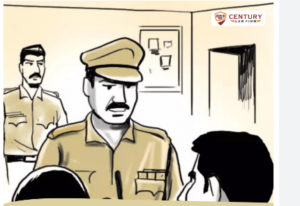In the pursuit of a more inclusive society, it is imperative to ensure that every individual, regardless of their abilities, has equitable access to justice and legal recourse. For the visually challenged, navigating bureaucratic processes such as filing a police complaint can present significant hurdles, often leading to their voices being marginalized or unheard. Recognizing this challenge, a new program has been initiated to empower the visually challenged community by facilitating the process of filing police complaints. This article delves into the intricacies of this program, its significance, implementation, and potential impact on fostering inclusivity and accessibility within the legal system.
 for more information click on this link
for more information click on this link
- Traditional methods of filing police complaints heavily rely on written documentation and verbal communication, posing challenges for those with visual impairments who may struggle to read or write.
- Bureaucratic procedures involved in filing complaints, such as completing forms, providing statements, and understanding legal terminology, can be daunting for individuals with visual disabilities, leading to feelings of frustration and exclusion.
- Police stations and legal institutions often lack the necessary infrastructure and accommodations, such as Braille materials, tactile maps, and assistive technologies, to cater to the needs of visually challenged individuals, further exacerbating their sense of alienation.
- Due to these barriers, visually challenged individuals may have to rely on assistance from others, compromising their autonomy and privacy, and potentially deterring them from seeking legal redress.
Introducing the New Program Visually Challenged:-
In response to these challenges, authorities have launched a groundbreaking initiative aimed at empowering the visually challenged community to assert their rights and access justice effectively. The program comprises several key components designed to streamline the process of filing police complaints and enhance accessibility for individuals with visual impairments:
- Leveraging advancements in assistive technologies, such as screen readers, voice recognition software, and accessible websites, to create digital platforms that enable visually challenged individuals to file complaints independently and efficiently.
- Developing accessible formats of legal documents, including complaint forms, witness statements, and legal notices, through methods such as Braille transcription, large print, and audio recordings, to ensure that visually challenged individuals can comprehend and engage with legal proceedings effectively.
- Conducting training programs and sensitization workshops for law enforcement personnel and legal professionals to raise awareness about the needs and rights of visually challenged individuals and equip them with the necessary skills to provide inclusive and accessible services.
- Collaborating with advocacy groups, non-governmental organizations, and community-based organizations to disseminate information about the program, provide outreach services to visually challenged individuals, and solicit feedback for continuous improvement.
Significance and Potential Impact:
The implementation of this program holds immense significance for advancing the rights and well-being of the visually challenged community and fostering a more inclusive and accessible legal system. Some potential impacts include:
- By providing visually challenged individuals with the tools and resources to navigate the legal system independently, the program empowers them to assert their rights, advocate for themselves, and participate actively in civic life.
- Removing barriers to filing police complaints enhances access to justice for visually challenged individuals, ensuring that they are not denied their fundamental rights due to their disability. The program sends a powerful message of inclusivity and equality, signaling a commitment to upholding the principles of social justice and human rights for all members of society, regardless of their abilities.
- By sensitizing law enforcement personnel and legal professionals to the needs of visually challenged individuals and equipping them with the necessary tools and training, the program enhances the quality and responsiveness of services provided to this marginalized community.
Challenges and Considerations:
While the new program represents a significant step towards inclusivity and accessibility within the legal system, several challenges and considerations must be addressed to ensure its effectiveness and sustainability:
- Adequate funding and resources are essential for the successful implementation and scale-up of the program, including investment in assistive technologies, training initiatives, and infrastructure upgrades.
- The program should be anchored within a robust policy framework that mandates inclusive practices and sets clear guidelines for accommodating the needs of visually challenged individuals across all stages of the legal process.
- Meaningful engagement with the visually challenged community is critical for tailoring services to their specific needs, addressing concerns, and building trust and confidence in the program.
- Regular monitoring and evaluation mechanisms should be established to assess the program’s impact, identify areas for improvement, and ensure accountability and transparency in its implementation.
The introduction of a new program to facilitate police complaint filing for the visually challenged represents a significant milestone in the journey towards a more inclusive and accessible legal system. By addressing barriers to justice and empowering individuals with visual impairments to assert their rights, the program embodies the principles of equality, dignity, and social justice enshrined in the Constitution of India. As efforts to advance disability rights and promote inclusivity continue, it is imperative to build on the momentum generated by this initiative and strive towards a society where every individual, regardless of their abilities, can fully participate and thrive.





